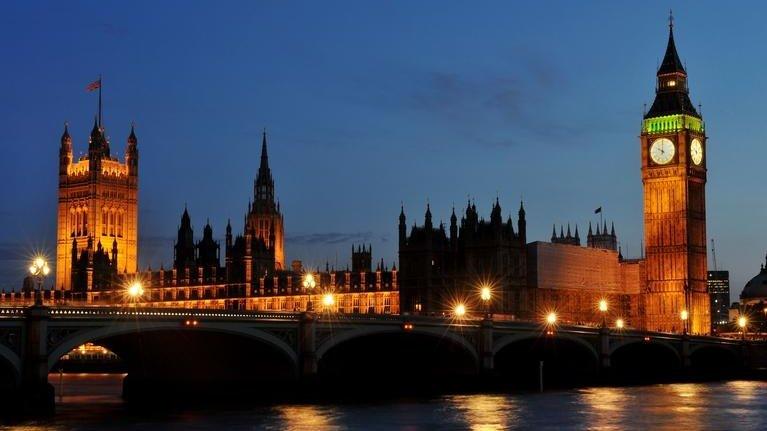Line in the sand no more
- Published

Scottish Tory leader made a speech on further fiscal devolution
Extraordinary weather we have been enduring. Quite appalling. Phenomenal, with varying impact across the country. And now, it would appear, it has washed away a line in the sand.
Said sandy boundary, you may recall, was drawn by Ruth Davidson as she campaigned to win the leadership of the Scottish Conservatives. A successful campaign, as it turned out.
This far and no further, she implied. Up with more she would not put. The Calman Commission had resulted in the Scotland Act, bringing new financial powers for Holyrood, among sundry other things. That was the sandy line.
However, today, that border is being breached. The sand is being kicked around. Not by a marauding, external bully - but by the original creator, she who drew the line.
Now, Ms Davidson will tell you that the "line in the sand" rhetoric was in the context of a highly competitive leadership race and was, in any case, over-written by the wicked media.
However, the impression left in the mind of the voters was clear. Her chief opponent, Murdo Fraser, was for radical change, for creating an entirely new party in Scotland. She was the conservative, on matters pertaining both to the party and to Parliamentary powers.
Now, all change. In a considered speech today, she commits the party to advocating substantial further devolution - assessing the existing Westminster reserved powers and, more, backing a significant further transfer of revenue-raising clout to Scotland.
I have long argued - as witness sundry essays and a book published way back in 1999 - that the internal logic of the Tory position demanded support for substantial tax devolution, if not fiscal autonomy.
That is because the instinctive position of the party and its supporters is to reduce spending and curb taxation. It is the natural Tory offer. And one can only credibly make that offer when the fiscal palette is extensive and multi-hued; when there is sufficient real scope for cutting taxation as well as spending.
It has not been a credible offer under the existing set-up at Holyrood. Yes, Scotland voted for her restored parliament to have limited tax powers. It was a key aspect of the founding debate. But those powers were never sufficient to enable a serious tax-cutting offer to be sustained.
The "Tartan Tax" - plus or minus a maximum of 3p of income tax, levied upon the standard rate only, not the upper rates - was simply too limited for credible use. It risked too much political damage for too little revenue gain.
So, that is one factor underpinning Ruth Davidson's intriguing speech. But there are others. In a different context, Ms Davidson notes in her speech that "you learn from experience".
The experience driving her, I feel certain, is that of her party being routinely thumped in elections. The Tory decline in Scotland, remember, is mighty and prolonged.
In the year I was born, 1955, the Tories gained 50.1 per cent of the vote in Scotland; the only party to achieve a popular majority since universal suffrage. The only party. Since then, they have declined and declined, with episodic mini-revivals to mask the trend.
Why? Because, in that long term, they came to be seen as a party which was alien to Scotland or, more precisely, whose roots were other than Scottish.
Parties of the right customarily play the patriotic card. They wave the flag. The snag for the Scottish Tories is that they picked the "wrong" flag for their electoral survival. As Scots increasingly clutched the saltire, urging a political response to their sense of Scottish identity, the Tories were brandishing the Union Flag and disowning devolution.
'Lone voice'
That does not mean, incidentally, that brandishing the saltire is purely a Nationalist act. As Ms Davidson notes today, Scottish patriotism need not be confined to the SNP or supporters of independence. It does mean, however, that parties with hopes of electoral success in Scotland will be acutely aware of the Scottish dimension to politics.
Ruth Davidson remarks in her speech today that the fact her party found itself "as a lone voice saying 'no' in the referendum campaign simply underlined the impression we had no real faith in our country."
No more, she argues. She has set up a commission - chaired by Lord Strathclyde, backed up by Annabel Goldie and Alex Fergusson - to examine the state of devolution, with an evident predisposition towards further financial powers.
Her argument is that a mature Parliament would have significant tax powers alongside its control of spending. Holyrood, she argues, is slanted too much towards discussions about expenditure. She argues further that the Tories in a revenue-running parliament would be advocating cuts in taxation.
But there is a further motivation behind Ms Davidson's initiative, I would suggest. Her narrative fits rather neatly with concerns at the UK level, particularly among UK Conservatives.
I am not, repeat not, saying that her narrative is driven by London. I am, however, saying that it dovetails rather helpfully with UK Conservative anxieties.
David Cameron is facing pressure over two issues, linked to Scotland. One is the West Lothian question - the issue of Scots MPs voting at Westminster on issues solely affecting England. The other is the Barnett Formula which annually alters the amount ceded to Scotland via block grant.
As I have noted elsewhere, the argument is somewhat inchoate and linked, vaguely, to the debate over Britain in the European Union. The good and sensible people of England are, it would appear, somewhat disquieted with their constitutional lot, inasmuch as they have begun to consider it at all.
Re Scotland, they are unhappy - or can be encouraged to be unhappy - over West Lothian. And they are unhappy - or can be ditto - over Barnett or, more precisely, the impression that Barnett feather-beds the Scots.
Conjoined policy
It was once suggested to me that the answer to the West Lothian question was: "Stop asking such an irritating question." But such benign neglect is not available to the PM. Hence his commission which is concluding, to no great surprise, that it is not practical simply to exclude one category of MP, the Scots, from all Parliamentary votes affecting England.
I say "to no great surprise" because political leaders since Gladstone, with his "in and out" notion, have been trying to equate the sovereignty of Westminster with devolved self-government outwith England.
Which leaves Barnett. Again, as repeatedly noted here, Barnett is a convergence formula designed to reduce Scotland's historic spending lead which is based upon sparsity and diversity of population, together with defined need. (Plus, of course, there is the separate SNP argument that Scotland has more than paid her way if a share of oil is included.)
But stick, for now, to the Tory perception of Barnett. What might alleviate that inchoate southern disquiet? Why, the abolition of Barnett and the introduction of a system of self-funding for Scotland.
One can almost hear David Cameron announcing such a development in triumph - a conjoined policy, blending confidence in Scotland with reassurance for England.
Indeed, Ms Davidson hints at such a prospect in her speech today when she says "the much-derided and little-understood Barnett Formula is already in its death throes". Further fiscal devolution would, she argues, render Barnett redundant.
Be clear about another thing. This is the Tory offer. Not a joint effort with other parties in Better Together. The Liberal Democrats already have a proposal on the table. Labour will produce an interim version at their conference in a couple of weeks time.
So why don't they work together? No time - the focus is on defeating independence. No will - the parties do not completely agree and see little reason to pretend they do. No point - they believe it will be sufficient to offer practical competition to independence in various forms. To say more than simply No.
- Published26 March 2013

- Published25 March 2013
